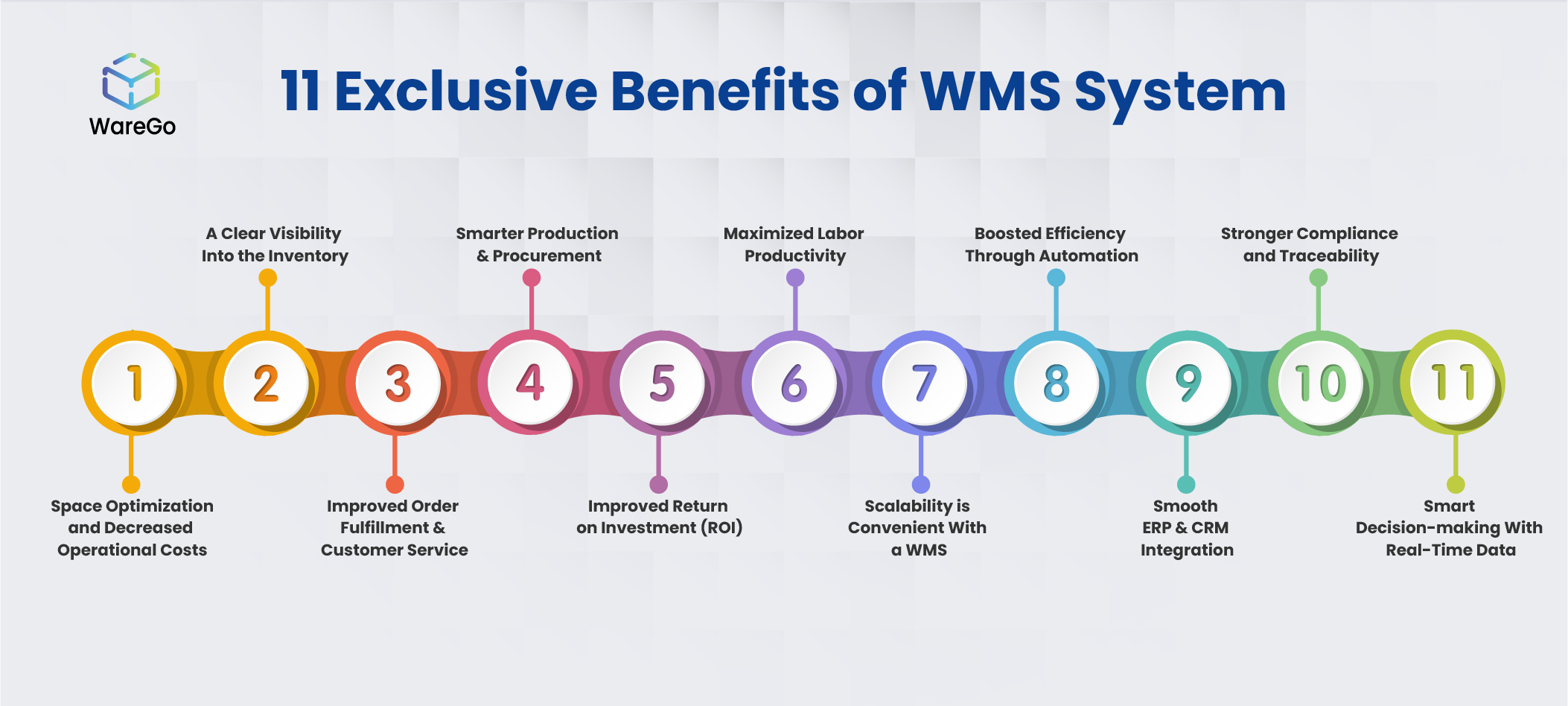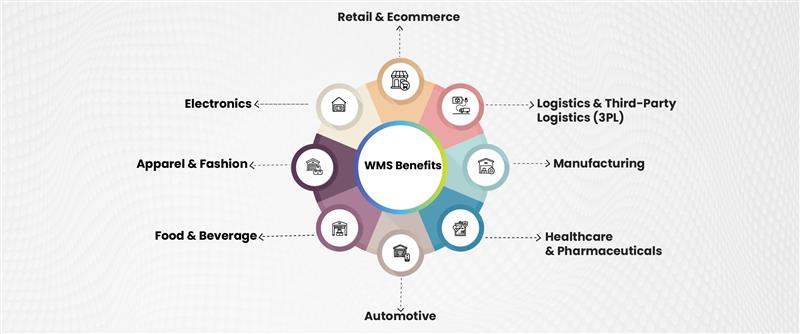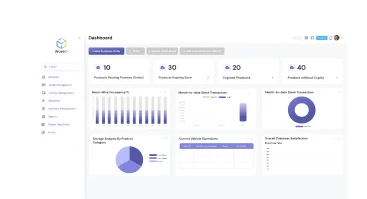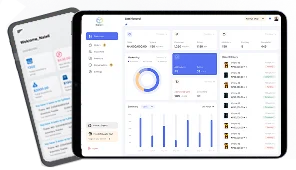
Since 1975, WMS solutions have been known for streamlining operations, improving productivity, ensuring the accuracy of inventory levels, and tracking real-time data. But are these benefits enough to justify the investment? Well, there are more valuable WMS benefits that businesses should discover before investing in the software and elevate their business operations confidently.
Our blog post takes you through the wms advantages and disadvantages, and other elements you need to know.
Table of Contents
What is a Warehouse Management System?
WMS is a software application that helps businesses with global supply chains and high inventory turnover streamline their operations. These platforms are specifically designed to make operations efficient from the time materials enter the warehouse to the moment they are delivered.
Why is WMS Needed?
Wholesalers, 3PL (3rd party logistics), shippers, and eCommerce businesses with extensive inventory management struggle to manage everything manually and often face errors and failures when it comes to order fulfillment. And that’s exactly where the need for WMS arises.
According to a report published by Statista, eCommerce sales will exceed 4.3 trillion U.S. dollars worldwide in 2025, meaning more accuracy and efficiency in operations will be needed, and it is not possible without digital WMS software, which offers visibility in the company’s inventory, help in picking and packing processes, make resource utilization convenient, and more.
WareGo offers 3 brilliant subscription models for its warehouse management software while charging no implementation costs. Check it out now!
Sign Up11 WMS Benefits You Need to Know
Before making a big business investment like WMS implementation, it is natural to think about whether or not it is a wise decision. To ensure you are making the right decision, check out the following WMS system benefits.
1. Space Optimization and Decreased Operational Costs
One of the core functions of WMS is the optimization of floor space to make sure that the whole warehousing process is effective and efficient. It works by managing the floor based on the task at hand and the nature of the materials. Space optimization is among the top benefits of a WMS because it reduces the waste of important floor space and the time it takes to locate the product. A WMS does it by analyzing the floor and discovering how it can be used in the best way. Space optimization also helps reduce the potential cost that might occur due to less time-efficient product storage, movement of products, and retrieval. A 3PL WMS helps find the right space to store goods, equipment, and materials, ultimately resulting in lower spending.
Another great extension of this benefit is material rotation. WMS software makes it happen through FIFO, which is first in, first out, or by LIFO, which is last in, first out, and last but not least, via FEFO practice, which is first expired, first out. All these practices are vital to improving warehouse efficiency. LIFO helps in cutting down on warehouse system cost by improving the use of space and movement. FIFO and FEFO help protect products from aging in the warehouse and eventually going to waste.
2. A Clear Visibility Into the Inventory
One of the other benefits of a WMS system is that it provides clear visibility into the inventory. When we deal with inventory in a warehousing environment manually, it is expected to come across errors. These errors can be missed orders, being overstocked or understocked, or simply being unable to manage the entire coming and going of goods. However, with a WMS system, you can keep a real-time check on inventory levels, which helps you have the right quantity of stock at all times. Apart from visibility and keeping track of inventory, you can make timely decisions for costing, labor management, restocking goods, and avoiding overcommitting to clients, which might strain your reputation on a wider level.
3. Improved Order Fulfillment & Customer Service
The success of businesses is in fulfilling commitments, and completing orders is one of the commitments customers look forward to. When bulk orders take place, it is difficult to know whether you have enough inventory to fulfill them, but with a WMS, you can do that in no time. Other than that, when you integrate WMS software with eCommerce or CRM systems, you can easily serve the customers without having to memorize tracking numbers, update customers with order status, and simply manage the data manually.
Manual customer care becomes difficult with bulk orders and often results in overcommitments, which eventually leads to a poor reputation. With WMS features, you can offer a seamless customer care experience by automating tasks like order confirmation and shipping updates. And the best part? This whole process can be customized to meet the hour’s needs.
4. Smarter Production & Procurement
Two elements, namely forecasting and inventory information, are the core of overall warehouse operations. With a cloud based WMS like WareGo, you get ahead of these two and ultimately secure efficiency of production, planning, and procurement for your business. The purchasing and production team can leverage WMS software to coordinate between lead times and inventory levels to enhance the flow of products, eliminate waiting times, and improve the entire supply chain process.
5. Improved Return on Investment (ROI)
The most untalked benefit of a wms is the return on investment that businesses enjoy after implementing a WMS software system. A WMS improves return on investment by elevating efficiency, cutting operational costs, and ultimately, improving customer satisfaction. A WMS software is built to automate tasks, simplify warehousing operations, provide real-time visibility into inventory, and more to reduce errors, decrease labor expenses, and make order fulfillment quick and timely.
6. Maximized Labor Productivity
Other notable benefits of WMS include maximized labor productivity. The warehouse is a large space, and managing labour efficiently is only a dream for the floor managers. Assigning tasks to employees based on their skill level, need in the warehouse, and expertise with equipment can be difficult, given the number of tasks, workers, and limited time at hand. With a WMS, this all can be done actively, ensuring maximum productivity is delivered by the employees of the warehouse. Moreover, reducing the travel time in the warehouse to better utilize the labour is also among the biggest benefits of integrating WMS software.
A WMS works by identifying the tasks where workers have performed well, and based on that, it allocates the job to every worker. Labour forecasting is a great feature of WMS, which helps assign tasks on a daily basis and design schedules that are efficient and result-oriented. When labour productivity is being discussed, it is worth noting that with a WMS, you can scan a product on entry in the warehouse and when and where it is moved; it cuts the need to double-check every product and saves workers for more important tasks.
7. Scalability is Convenient With a WMS
With the ever-changing demands of modern businesses and customer expectations, it is difficult to manage everything manually. For this, a WMS solution can come in handy. Retail warehouse management systems are built to adapt to the business needs. Whether it is about expanding to new locations, handling a higher volume of orders, keeping a check on increased inventory levels, or more, a great WMS makes it all convenient for 3PL and other supply chain management businesses. Also, it is worth mentioning that even when the work elevates, a cold storage WMS never lacks efficiency and makes sure to deliver results that make operations easy for you.
8. Boosted Efficiency Through Automation
While it seems like all the benefits of a WMS are connected to the WMS software itself, this is not always the case. A WMS software opens doors for more technologies to make your business efficient, like the use of mobile devices. Once the WMS is connected to the mobile devices of managers and employees, it automates the warehouse’s entire work process, enabling the team to view tasks on mobile phones and making processes easier to accomplish as compared to how they were done in previous paper times. Mobile devices not only elevate the horizon of work but also help in the scalability and accuracy of information.
Since WMS automates the operations, it will help in improving the overall operations with the help of better, more workable strategies. While we talk about automation, it is to be noted that automation includes everything from auto picking and packing, analytical improvements, the use of AI, robotics, and more. With the help of these strategies, WMS systems help identify, record, and communicate activities. Examples of these automation activities are censoring, barcode scanning, picking and packing, and more.
9. Smooth ERP & CRM Integration
One of the commonly asked questions by business owners is, “Can WMS integrate with my existing software?” Well, the answer is yes. All advanced WMS software can easily integrate with your existing software, whether ERP, CRM, accounting software, or other eCommerce platforms. Thanks to this brilliant feature, data flows seamlessly throughout all the departments, decreases the space for manual errors, and elevates the overall warehouse experience. With the help of ecommerce WMS software, businesses can easily sync inventory information with their eCommerce store or update order statuses in the ERP, making the overall process accurate and aligned.
10. Stronger Compliance and Traceability
A warehouse system benefits businesses by ensuring that compliance and traceability are improved through inventory tracking, automated processes, and detailed records. This makes a business become prominent in the industry and offer top-notch customer service to clients, whether it is by meeting the industry standards, enhancing visibility of the entire supply chain, or even reducing errors.
11. Smart Decision-making With Real-Time Data
As discussed earlier, a WMS enables managers and workers to stay ahead of real-time data, which enables them to make smart business decisions in times of need. The success of a business is determined by the collective decisions made throughout the business process, which is exactly what WMS software helps with. Not only this, but when you achieve data-backed visibility in your warehouse, you will be able to identify trends, discover bottlenecks, and optimize operations for better performance and revenue.
We cut the confusion for you. Instead of comparing WMS benefits, choose WareGo to experience an ultimate WMS experience like no other.
Contact Us NowDisadvantages of WMS
Since our blog post is about WMS benefits and disadvantages, let’s shed some light on how choosing a WMS for your business can negatively impact you. While there are only a few disadvantages, it’s worth knowing everything before deciding.
High Costs On an Initial Level
Unlike WareGo, most SaaS companies charge high implementation fees for wms. While it is a necessary investment for most businesses, not having to secure the amount back in the first year of WMS deployment can become a major disadvantage of WMS.
If you do not want to pay the implementation fees of WMS, check out Our pricing, as they charge nothing for implementation.
Extensive Setup Time
Every business, small or large, has a set of system software already installed before the WMS implementation, and connecting the WMS with these systems is likely to cost a lot of time, which becomes another disadvantage.
It is important to ensure your new WMS is connected correctly with software like accounting and marketplaces. Once your WMS is connected, it can offer advanced features like courier rules and more to help you get the best rates.
Hectic Data Maintenance
Unfortunately, in some WMS systems, the data maintenance and transferring process is not automated, and this contributes to a need for professionals who ensure data is transferred in the correct way. Other than this, data sources, integrations, and other systems are easy to link with the WMS software, like the one by WareGo.
Centralized Weak Spot to Consider
When you connect all your systems with the WMS, you are likely to create a centralized weak spot for your business or warehouse operations. It can become a huge issue if the system experiences downtime or loses data due to an error, stopping business operations all at once.
While it may scare most business owners out there, investing in reliable WMS software like WareGo can save you from hard times like this, making sure your warehouse operations are always up and running.
Time-Consuming Customizations
While it is true that WMS systems can be customized to meet business needs, it is worth mentioning that this process takes time. Depending on the complexity of the features required and the nature of the business, customization can take time from a few months to almost a year.
The timeline of customization generally includes data preparation, system configuration, and testing.
With WareGo, warehousing has been made easy. Start a free demo today.
Start a DemoWMS Benefits Across Key Industries

While we have already covered WMS benefits, learning how WMS software benefits your industry can help make an informed decision.
Retail & eCommerce
The retail and eCommerce industry is built on high-paced operations, extensive transactions, and never-ending consumer demands. This complex nature makes this industry prone to errors in operations, which occur due to human input. When you implement a cloud-based WMS, you receive the following benefits:
- A real-time check on inventory levels at all times.
- Improved order fulfillment which is impossible with human-driven processes.
- No more fear of being understock or overstock as WMS covers it all.
Manufacturing
The manufacturing industry deals with excessive production workflows, tracking products and raw materials, and coordinating between different departments of the manufacturing company. In such cases, you must ensure efficiency and accuracy to avoid downtime and maintain product quality. A WMS helps you achieve all of this. The other benefits include:
- Streamlining of production throughout the supply chain.
- Tracking of raw materials with accuracy
- Improved production and planning, and ultimately better end results.
Food and Beverage
The food and beverage industry is a critical one as it deals with perishable goods, which have expiration dates and might go bad if not looked after correctly. Other concerns include temperature controls and regulatory compliance, which cannot be efficient enough to meet the mark. That’s where food and beverage WMS software comes in. Its benefits include:
- Efficient product movement and expiry date management as compared to humans.
- Accurate tracking of the cold chain.
- Proper regulatory compliance and traceability
Healthcare & Pharmaceuticals
Since healthcare and pharmaceutical industries are sensitive in nature due to high-value and regulated products, the accuracy rate of inventory management is vital to meet strict storage guidelines, traceability, and compliance. However, you can make the process convenient by leveraging the benefits of a WMS, which includes:
- Efficient tracking of batch and lot.
- Controlled substance compliance.
- Improved accuracy of inventory.
Automotive
Automotive is another industry that requires efficiency, as it includes managing fast-moving automotive parts, requires timely delivery, and operates within an aligned supply chain. When it comes to this industry, distribution and assembly require precision and speed. For such cases, a WMS works great and can offer the following advantages:
- Automotive business owners can enjoy just-in-time inventory.
- Tracking of parts becomes efficient.
- A WMS improves coordination with suppliers.
Third-Party Logistics (3PL)
Third-party logistics, generally called 3PL is a comprehensive industry that requires simplicity and efficiency for top-notch services. These services include serving clients in various industries by providing warehousing, order fulfillment, and transportation services. With a 3pl warehouse management software, you can:
- Do multi-client inventory management.
- Make customizable billing and reporting.
- Ensure scalable operations.
Electronics
Electronics companies are all about handling intricate components, rapid product cycle changes, and extensive value inventory. To stay competitive, timely tracking and secure storage are important to maintain unmatched quality and reduce losses. With a WMS by your side, you can enjoy benefits like:
- Management of high-value inventory
- Specified component-level tracking
- Reduced major risks like obsolescence
Apparel & Fashion
Apparel and fashion industries are full of ultimate changes due to season, large SKU counts, and extreme return rates. Therefore, this industry is the one that needs proper visibility in inventory and the ability to cater to shifting trends in a quick and efficient way. The WMS benefits include:
- SKU-level visibility for better inventory management.
- Organized seasonal demand planning for better results.
- Fast return processing for improved customer satisfaction.
Choose WareGo for the Brilliant Benefits of WMS
Manual management does not offer the level of efficiency you need to scale your supply chain workflow. Take advantage of our top-tier warehouse management software, specifically designed for warehouse businesses, to gain high-level visibility, improve accuracy and control, and achieve massive savings. 6 core and 50+ industry-leading integrations make WareGo one of the best wms software companies, standing out as one of the most detailed WMS solutions your supply chain business could ever find. Our WMS offers the following functionalities to make your warehouse operations a breeze.
Inbound Management
For warehouses, managing incoming national or international shipments is the most important task, and knowing how to choose a wms that supports this process is key. With WareGo’s WMS, you can receive goods, document them, store them in efficient storage spaces, and ultimately manage the entire inbound logistics process with ease and accuracy.
3PL Billing
If you are a 3PL needing a WMS, WareGo is the right one for you. Our 3PL billing feature automates the generation and management of invoicing processes for the services you provide to your customers. Our billing includes tracking multiple costs, including but not limited to storage, handling, transportation, and more.
Serial & Expiration Dates
If your warehouse stores perishable goods, managing them and getting them out of the warehouse can be time-consuming and sometimes impossible. A WMS with serial numbers and expiration date tracking can make the work easy for you in such cases. With WareGo’s serial number and expiration tracking, you can easily track inventory in the warehouse and put it out for delivery as per its expiration dates.
Pack Station
With WareGo’s packing station, you can enjoy the underrated benefits of the WMS system. At a pack station, workers check, pack, and label your products for efficient shipping. Also, an efficient packing station makes the process easy and improves your order fulfilment success.
Shipment Management
Just like receiving goods, shipping is also an important part of the warehousing business. With our shipment management functionality, companies like yours can leverage automation and streamline the process of shipping, which includes the selection of orders, selection of services, document generation, and tracking of information.
Whether it's standard, pro, or advanced, our pricing models are curated for diverse warehousing needs.
View PricingConclusion:
WMS software is essential for managing warehouse operations with greater accuracy and fewer errors—key goals for 3PLs, distribution centers, retailers, and manufacturers. It helps streamline product management, categorization, and order fulfillment, reducing issues like missed orders and delayed shipments. While WMS has some drawbacks, its benefits far outweigh them. We hope this blog helps you evaluate both sides and make the right choice for your business.
Frequently Asked Questions (Top FAQs Related to WMS Benefits)
What are the benefits of WMS?
Benefits of WMS include improving inventory management, streamlining processes, cutting costs, and elevating customer satisfaction. A WMS does it by automating inventory tracking, picking, and packing to add efficiency to warehouse operations, increase productivity, and reduce errors.
What is the purpose of the WMS?
The purpose of the WMS is to simplify warehousing operations and add efficiency by managing inventory, tracking products, and accurately fulfilling orders. It provides a real-time check of the inventory, product locations, and movements, making the overall process more efficient.
What are the 5 advantages of a wms?
The 5 advantages of a warehouse system include optimizing space, decreasing operational costs, providing clear visibility in inventory, improved order fulfillment and customer service, smarter production, procurement and maximizing labor productivity.
What is the main function of WMS?
The main function of WMS is to streamline and optimize the way a warehouse operates. It includes receiving products, storing them correctly, choosing products on the basis of expiry, shipping them, and more. Ultimately, a WMS works to make managing and moving products convenient in a warehouse.





